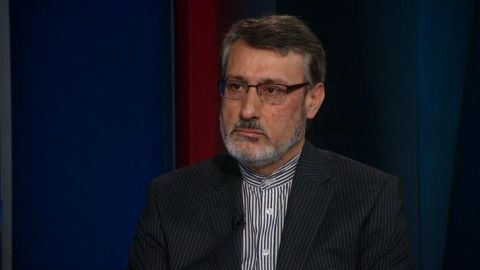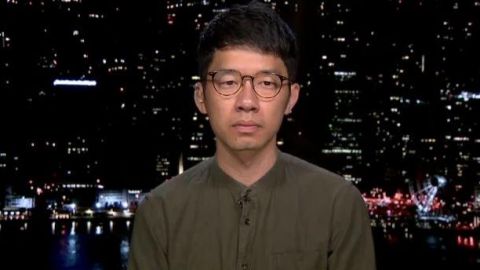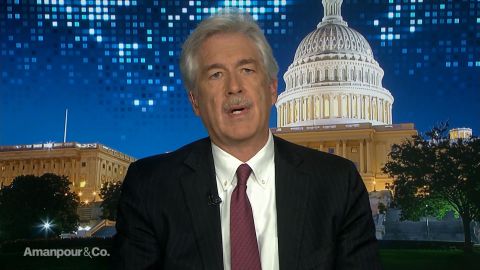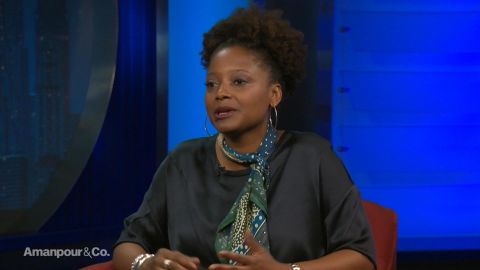Read Transcript EXPAND
CHRISTIANE AMANPOUR: Tracy K. Smith won the Pulitzer Prize in 2012 for “Life on Mars.” A collection of poems on science and religion. And she’s been the face of American poetry every since 2017 when she became poet laureate. Her new book, “Wade in the Water” brings us back to earth and explores American history through and extraordinary series of letters exchanged between slaves and their owners in the 1800s. And she sat down with our Walter Isaacson to talk about it.
(BEGIN VIDEO TAPE)
WALTER ISAACSON: You’ve written extraordinary memoir, “Ordinary Light” in which you talk about your childhood, your background. How does that relate to your poetry?
TRACY K. SMITH, AUTHOR: I think a lot of the stories that I tell in “Ordinary Light” and some of the questions about family and individuality live in my poetry but they came out differently in prose. I felt like telling the story of family in prose was an act of persistence peeling back different layers that in my poems I’d managed to leap away from. It also allowed me or even maybe forced me to develop a vocabulary for talking about race that I hadn’t as a poet found. And faith was also part of my upbringing. And “Life on Mars” there’s some questions about God and the Afterlife that come in but I wanted to go back to the very beginning and think of how did God become a part of my life. How have I wrestled with — with that relationship and what does it tell me about who my parents were and who I am. So the memoir answered — answered those same questions differently for me.
ISAACSON: So let’s start with your father who’s a NASA engineer but growing up black in the segregated south before then. Right. And then you write “Life on Mars” we seems to have some resonance from what he’s doing.
SMITH: My father was born in 1935 in rural Alabama. He left the south in the early 50s to join the Air Force. And he always told us he left because the south was too hot but I think that there were other factors at play as well. He was somebody who had a huge curiosity about the world and .
ISAACSON: And about the universe.
SMITH: And about the universe. Yes, a really systematic mind. She was an engineer by training. After he left the service he took a civilian job, which allowed him to work on the optics for the Hubble space telescope. And that was something that I think delighted him because he had been a science fiction lover growing up and to be working on a tool that would show us as he described it, how the universe itself was born was something that filled him with immense delight.
ISAACSON: And tell me about your mother and the influence she had.
SMITH: My mother was my dad’s generation. They were born within a year of one another. And she had been a librarian and a school teacher before I was born. And I knew her as a stay at home mom. Her faith in god was something that really drove our family and I think gave us a sense of hope and support. Getting through it was hard. It was always a matter of let’s get together and let’s pray about it. And she was also somebody who was really funny, who loved meeting new people and listening to their voices and stories and who would delight us with stories of her own upbringing in the south together. I think my parents really gave my siblings and me a sense of anchoring that stretched from, you know, the spirit realm and the sense that we belonged to a creator who loves and cares about us, and the sense of the world as something that was structure and orderly and that we needed to work hard to contribute to.
ISAACSON: Was there any tension between your father’s view of the universe as a scientist looking at it through the Hubble Spacecraft and your mother’s view of the universe look at it from a religious and spiritual viewpoint?
SMITH: It seems like there should have been, right? You know, we think about these two things as really different from one another, but my dad had this really beautiful way of synthesizing these perspectives, and I remember the question of, you know, creation versus evolution would always come up in conversations when they were talking about faith with somebody who wasn’t a believer. And what I would say, you know, the bible talks about time in heavenly terms and earthly terms, and I would love to believe that God’s sense of seven days might be millions or billions of years on Earth, and in that time evolution is probably something that could happen. And instantly I felt free. I felt free from this burden of having to say, well, if I love God, then I have to turn my back on these other things that feel real to me. He said, “no, you don’t.” The universe is huge and there’s a space in it for a lot of connections we might not think are logical.
ISAACSON: And your more recent book, “Wade in the Water”, is about thinking about what it’s like to be black in this world quite a bit.
SMITH: Yes. I mean, in some ways those very same questions – who are we? How do we relate to one another? And what do we do to one another – move through, I think, most of my work, but in this book, race became the point of collision, and I think it’s because we live in a moment where those questions of difference have suddenly become so profound and unsettling.
ISAACSON: Divisive.
SMITH: Yes. I mean, there’s a sense of violence that’s erupted around I think fear over this difference, and I felt suddenly like the history that used to feel so far behind us was kind of catching up.
ISAACSON: How can poetry help solve that?
SMITH: Well, I love poems because they pull me out of my own perspective. No matter what I’m reading, it’s a poem that’s coming from someone else’s vocabulary and imagination. And poem’s are something challenging to our own sense of authority, our own assumptions about the world, and if we let them, they invite us into a larger and stranger view of experience and of what is possible. If you do that enough, you become better at accepting other people on their own terms. You also become more curious about who they are and what experiences have contributed to their perspectives. And I feel like, you know, that’s one of the – one of the bridges that might get us from where we are to where we really ought to be.
ISAACSON: And one of the devices you use to do that is making poems out of a collage really of letters and entries and writings of African Americans who were fighting the Civil War or others. How did – how did you come up with that idea and how does it work as poetry?
SMITH: Well, I was interesting in history because it felt to eerily present. And so, I just was looking back at historical documents trying to learn. I had a question about what the experience of black soldiers and their families would have been in the Civil War. And so, I found all of these primary documents – letters and deposition statements. And whereas I thought I was going to be reading them, kind of metabolizing them and coming up with my own vocabulary for discussing them, I was overwhelmed by how moving, how coherent, how persuasive, poetic, and also alive those voices felt. And I said it doesn’t make any sense to overwrite these voices with my own. I should curate something. And so, that’s where, you know, the impulse toward a found poem began for me.
ISAACSON: And another thing you do in this book is I think you call them irracial (ph) poems in which you take a document, a document maybe we all know, some words we all know, but erase a couple of words. And explain that to me, and I think you have an example, declaration –
SMITH: Sure, yes.
ISAACSON: – which I’d love you to, if you don’t mind, read a little bit of.
SMITH: Yes. Well the eraser is an art form that’s been around for generations. And I think it’s interesting because it takes one document that expects to live in a specific context and to be received by a specific audience and it tampers with that a little bit. It invites us to hear it differently. And sometimes what you hear is a countercurrent. So I have a poem that is called “Declaration” that comes from the Declaration of Independence. I was re-reading that document and I got to a place where I began to hear something and the grievance that, you know, the colonists had against England that felt very similar to a grievance that contemporary blacks might have about the nature of America and American history, about the role of black life in the country through the ages. And it felt very unsettling to me. It’s funny because when you’re writing you’re often saying, “OK, I want to be spoken to. I want to hear something that’s not just me.” But when that happens, it can be really surprising.
ISAACSON: And so the poem is called?
SMITH: This poem is called “Declaration”.
ISAACSON: As in the Declaration of Independence —
SMITH: Exactly.
ISAACSON: — but with erasers.
SMITH: Yes. Declaration. He has sent hither swarms of officers to harass our people. He has plundered our, ravaged our, destroyed the lives of our, taking away our, abolishing our most valuable and altering fundamentally the forms of our. In every stage of these oppressions we have petitioned for redress in the most humble terms. Our repeated petitions have been answered only by repeated injury. We have reminded them of the circumstances of our immigration and settlement here, taken captive on the high seas to bear.
ISAACSON: And that’s of course from the Declaration accusing the king of England —
SMITH: Exactly.
ISAACSON: — of things he’s done and yet when you do the eraser it makes it more universal, something we live through every generation in our history.
SMITH: Yes. I think you’re right. I mean I definitely hear grievances that feel very applicable. But I also understand that it tells me this is a story that others have also lived in their way and shouldn’t that foster a kind of compassion, a kind of understanding. Or couldn’t it? And I think that’s a question that runs through many of these poems. And they’re poems that are hard on this country because I love this country.
ISAACSON: Another of those poems that’s striking in its political resonant strikes home to me because I’m from Louisiana. It’s about Baton Rouge and it’s about an amazing photograph of an incredibly well-dressed African- American woman elegantly standing there as the police are trying to restrain the crowd. Did you do that poem from looking at that photograph? And if so what was in your heart when you did it? And then maybe read us some of it.
SMITH: Yes, yes. I absolutely was looking at that photograph. It’s by Jonathan Bachman, the photo journalist, and the woman in it is named Leshia Evans and she was at a Black Lives Matter march and she’s wearing this gauzy sundress on a day where there’s like a gentle breeze. And so there’s this incredibly lyrical image of her with this – the wind blowing the dress back. But on the other side of the photo there are a number of police officers in riot gear and so there’s this really interesting imbalance between the weight and the defense on one side. And somebody that seems to be standing in peace. I had an immediate gut-reaction to that photo. But I wanted to look at it and see what else I could gather. I wanted to see if the photo could invite a different kind of vocabulary for the sense of tension. And so this is what – this is what I found. Unrest in Baton Rouge. Our bodies run with ink dark blood. Blood pools into pavement’s seams. Is it strange to say love is a language few practice but all, or near all, speak? Even the men in black armor, the ones jangling handcuffs and keys, what else are they so buffered against if not love’s blade sizing up the heart’s familiar meat. We watch and grieve. We sleep, stir, eat, love. The heart sliced open, gutted, clean, love, naked almost in the everlasting street. Skirt lifted by a different kind of breeze.
ISAACSON: Wow. I read a really nice New York Times profile of you, and it said that after reading that poem – I think maybe it was in South Carolina, somewhere – a group of police officers came up to you and said, “ride with us. See it from our side.” Tell me about that.
SMITH: Yes. I read this poem in a community center in South Carolina, and that happened. I shared it. As I was reading the poem, I could see the officers in the back and I was thinking, “I wonder what they’re going to make of this poem.” And afterward they came up and said, “you’re welcome if you come back, here’s our card. You’re welcome to come along with us and see how we do our job.” I read a lot of different things in that offering. It was kind. I think it was offered in a kind of mode of civility, but I think they were also saying it’s a complicated job that we do, there’s a lot at stake, and we want to show you how we – how we take it. I wish I could have gone with them.
ISAACSON: Will you do it sometime?
SMITH: If I go back, yes.
ISAACSON: I mean, that’s one of the things about poetry and your poetry in particular is that even though it’s sort of tough at times, it has a healing undercurrent to it. Do you feel that these poems could heal? Is that something you feel is a role of poetry?
SMITH: Well, I think poetry can do that. I think poetry teaches us to look at things in a more courageous way and to sit with them longer than most other forms of communication or just two at this moment in human civilization. But even going back to that offering, I believe that we’re accountable to each other and I think I want to believe that’s what those officers were saying. We’re accountable to one another. We’re accountable to you and maybe your imagination could also be accountable to the world that we move through. And I think the wish of that poem is to say how can we take this more seriously? Love is a huge enterprise and it exacts a lot of us. It’s challenging. It’s frightening to say if I love you then I can’t be happy or safe if you are not happy and safe. That’s a big investment, right? But I feel like it’s something that we need to begin to contemplate. And I think poems at least when I’m writing them, they feel like a little laboratory. You know, I can do these mental exercises, these thought experiments that might prepare me to live a little bit differently, to live with a great sense of accountability.
ISAACSON: What did you learn from studying from Seamus Heany?
SMITH: I learned that poems can take on huge questions, questions about responsibility, and that poems can also bring us into greater contact with the private, with the world that we know and belong to even if it’s changing, even if it’s gone. Poems can help us to touch base with the people that we love even they’re lost to time or distance. I also learned that being a poet can be a joyful enterprise even when you’re writing about things that are serious. I remember when I was Seamus’s student I gave him a book to sign at the end of the year, and it was my senior year of college. And so, my heart was heavy. I didn’t know what I was going to be doing exactly, but I know what I hoped to do. And so, I gave him the book and I was sitting there as he signed it, and his inscription was a quote from Yates, and it said, “and wisdom is a butterfly and not a gloomy bird of prey,” and I love that because he was telling me king of buck up, kid. We’re doing this –
ISAACSON: And do you think that’s informed your –
SMITH: I hope –
ISAACSON: – because there’s a lot of gloomy stuff that you have to write about, but you keep the butterfly alive?
SMITH: I hope so. I think about that a lot. I think about the what I now realize was kind of an ugly seriousness that I was taking and applying to these questions. And I think Seamus’s model is you can do this with an abundance of hope and joy and kindness and generosity and you can still get to the hard stuff, too.
ISAACSON: Tracy K. Smith, congratulations on your new collection.
SMITH: Oh, thank you.
ISAACSON: And thank you for being with us.
SMITH: It’s a pleasure.
About This Episode EXPAND
Christiane Amanpour speaks with Hamid Baeidinejad and William Burns about the current stand-off between the United States and Iran. Nathan Law joins the program to discuss protests in Hong Kong. Walter Isaacson speaks with Tracy K. Smith, the 22nd U.S. Poet Laureate, about her new book, “Wade in the Water.”
LEARN MORE



